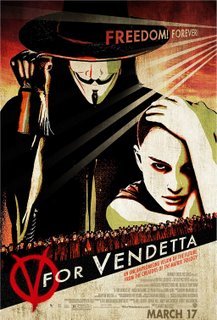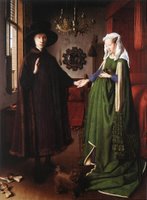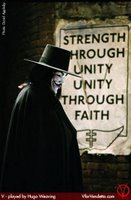A Fiver for V
 There are times when moviegoers should really have their expectations set low before walking into the theater, just so they can be humbled to the dust when they end up liking what they saw. I'll admit that I was probably one of the few who were actually skeptical of V for Vendetta when the previews first started rolling several months ago, and the resulting humility that I felt walking out of the cinema was just barely overshadowed by the laps my mind was running. I'm not as enamoured with 'The Wachowski Brothers' as some (I generally think that anyone who refers to themselves by the title, _______ Brothers, needs to put the PSP down and get off the bus right now). But before you assume that I've gone and registered at all of the MTV fanboy forums (I'm still trying to get them stoked on Ken Loach), let me also say that I liked the film, but I didn't love it.
There are times when moviegoers should really have their expectations set low before walking into the theater, just so they can be humbled to the dust when they end up liking what they saw. I'll admit that I was probably one of the few who were actually skeptical of V for Vendetta when the previews first started rolling several months ago, and the resulting humility that I felt walking out of the cinema was just barely overshadowed by the laps my mind was running. I'm not as enamoured with 'The Wachowski Brothers' as some (I generally think that anyone who refers to themselves by the title, _______ Brothers, needs to put the PSP down and get off the bus right now). But before you assume that I've gone and registered at all of the MTV fanboy forums (I'm still trying to get them stoked on Ken Loach), let me also say that I liked the film, but I didn't love it.Firstly, I'm not one to focus on performances - since I know next to nothing about acting or how people 'should' act and 'convincing' is a term used to assume elitist authority over a process that I believe is completely subjective - but I was very impressed by Natalie Portman. I also have to admit that I expected it to be more stylized than it was, but maybe that's because I haven't read the graphic novel. Is the source material more comicky than the film? (comment your answer below)
That my expectations were surpassed in these instances only worked for the film, I think; weak or overstated performances and an overstylized mise en scène would, while appealing to the geek and anti-establishment crowds (and resulting in a flood of Slash Lit), only cheapen the effect of the movie.
 The artistic references and quotes were a nice touch, but anyone can quote Shakespeare or say they collect contraband artifacts and call themselves aficionados. Director James McTeigue distinguishes his film from other posers by assimilating, rather than just referencing, themes from such works as Shakespeare's Twelfth Night, or What You Will and Henry V and especially The Arnolfini Marriage by Jan Van Eyck - which was hanging on V's wall. The numerous reflective and lighting motifs that specifically borrow from the chiaroscuro elements in Van Eyck's painting were craftily brought into the film, not only as homage, but as subtle stylizing that wasn't overpowering or alienating. In fact, if you've never heard of Van Eyck or aren't familiar with Shakespeare's work, the film still flies brilliantly, since it isn't beating you over the head with self-indulgent intertextuality (which, for some reason, still works nicely in comedy).
The artistic references and quotes were a nice touch, but anyone can quote Shakespeare or say they collect contraband artifacts and call themselves aficionados. Director James McTeigue distinguishes his film from other posers by assimilating, rather than just referencing, themes from such works as Shakespeare's Twelfth Night, or What You Will and Henry V and especially The Arnolfini Marriage by Jan Van Eyck - which was hanging on V's wall. The numerous reflective and lighting motifs that specifically borrow from the chiaroscuro elements in Van Eyck's painting were craftily brought into the film, not only as homage, but as subtle stylizing that wasn't overpowering or alienating. In fact, if you've never heard of Van Eyck or aren't familiar with Shakespeare's work, the film still flies brilliantly, since it isn't beating you over the head with self-indulgent intertextuality (which, for some reason, still works nicely in comedy).Many of the more politically themed statements (yes, film is indeed very political, and this one overtly so) are very timely, such as the issue of patriotism vs. nationalism, symbols/acts of identity and purpose, as well as the ambiguity and subjectivity of the term Terrorism (V was both a terrorist and a revolutionary, kind of like George Washington or Samuel Adams and the Boston Tea Party folks). My advice to people who have a problem with this film's candid position on politics is that they shouldn't watch a film essentially inspired by Guy Fawkes.
 All of this isn't to say that I thought V for Vendetta was flawless - quite the contrary. The film's premise focuses on the evils of totalitarian leadership as it promotes the tagline, 'People should not be afraid of their governments. Governments should be afraid of their people.' While this palindromic phrase works well for catchy advertising, I wonder if fear is really what we should be promoting. It's as if to say that Big Brother does heinous things (which we hate, by the way), therefore we should become what we hate in order to overcome Big Brother. The film poses many problematic situations, but the only solutions it offers are similarly problematic.
All of this isn't to say that I thought V for Vendetta was flawless - quite the contrary. The film's premise focuses on the evils of totalitarian leadership as it promotes the tagline, 'People should not be afraid of their governments. Governments should be afraid of their people.' While this palindromic phrase works well for catchy advertising, I wonder if fear is really what we should be promoting. It's as if to say that Big Brother does heinous things (which we hate, by the way), therefore we should become what we hate in order to overcome Big Brother. The film poses many problematic situations, but the only solutions it offers are similarly problematic.I also found myself wishing there was more location shooting to really create a vivid cultural, distinctly British, context (there really is more to London than Big Ben and the Houses of Parliament). I'm sure that the Northerners would also agree that it painted a rather reductive view of Britain - especially since the industrial North has dealt first-handedly with vicious riots, anti-government/police protests, and general public disgruntlement well within the memories of most middle-aged Britons. The splattering blood also got a bit cliche when V took out the circle of policemen, almost to the point of being absurdly humourous, ala Kill Bill, which I don't think was their intention.
These little complaints, however, don't begin to overtake the fact that the depth of most scenes made my brain hum. If anything, the flaws and problematic situations only stimulate more thought, resulting in a few sleepless nights. Give a movie props when it can stay on my mind for several days afterward, and this one sure will.
Penny for the Guy? Give 'em a fiver.
Tagged under:
Film, Entertainment, Art
Labels: Critical Studies, Film, Reviews


0 Comments:
Post a Comment
<< Home